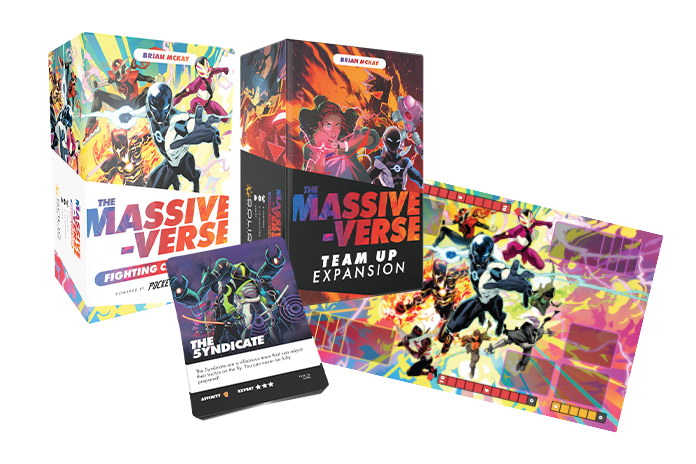Learn to Play Pocket Paragons
Pocket Paragons is a lightning quick game of snappy strategy and big reads and includes characters from AEGIS, Rivals of Aether, Acquisitions Inc, and more. Learn to play by reading the rulebook or with the rules on this page.
Rules
Setup
Choose a Paragon. Place a Paragon’s Character card onto the table, their Ultimate card adjacent to it, and the other cards into their hand. Each player takes a dial to track their HP and energy. If you do not have a dial, keep track of your HP and Energy on paper or on your smart device. Set HP to 10 and energy to 0. Reduce your enemy to 0 HP or Execute to win!

Execute
When you are Executed, you lose the game. Execute happens when a player plays Weapon when your opponent plays Rest. Every character in the game is capable of Execute. Some characters might have alternative ways to Execute.
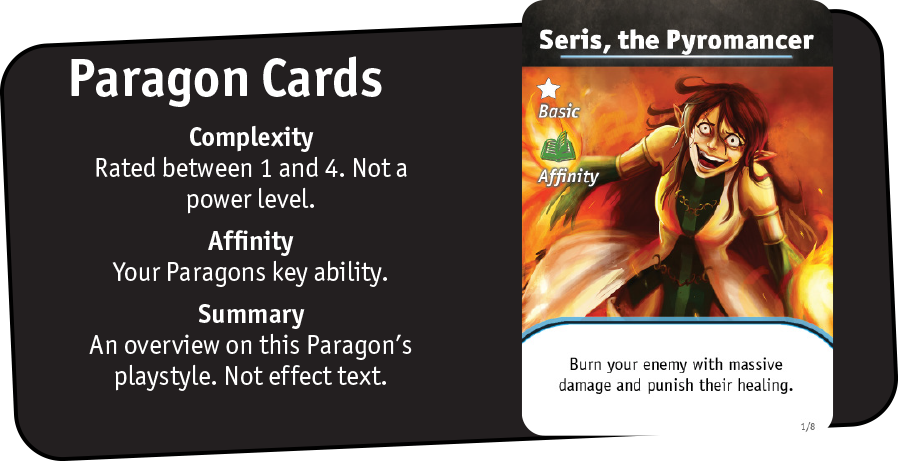
Your Paragon card is a summary of what to expect. There are no gameplay effects on Paragon cards.
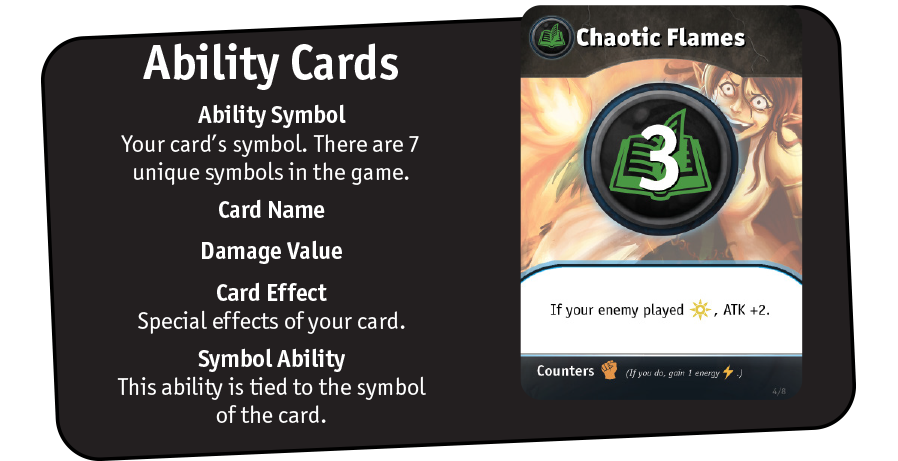
Most of the cards in the game are ability cards.
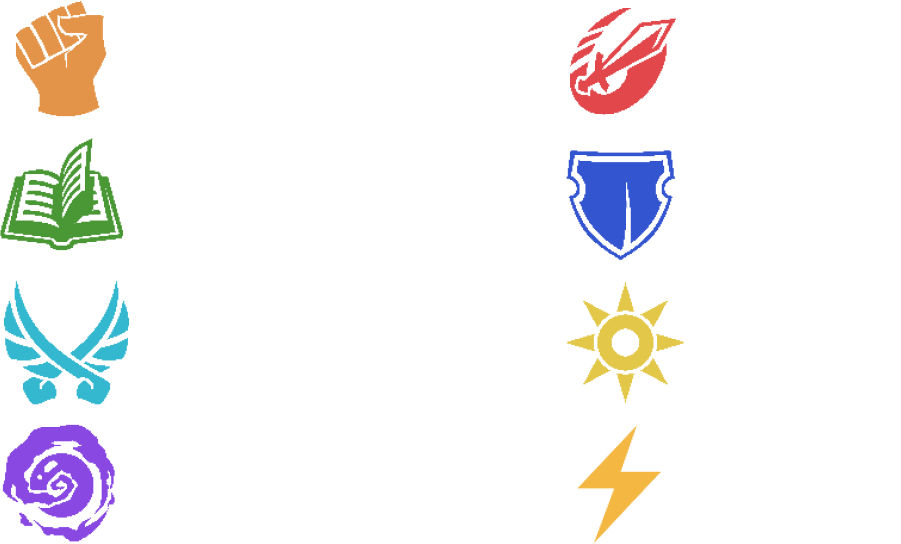
There are 7 ability types in the game
Physical: Your strong move
Agility: Your quick move
Intelligence: Your tricky move
Weapon: Your basic offense but it can Execute!
Block: Your basic defense
Rest: This is how you get your cards back
Ultimate: Your finishing move! (This card sits on the table next to your paragon)
Passive: An always-on ability. (This card sits on the table next to your paragon)
Other Elements
HP: Your Health. If it hits 0, you lose.
Energy: Used to power your Ultimate and Passive abilities. Sometimes regular abilities are powered up too!
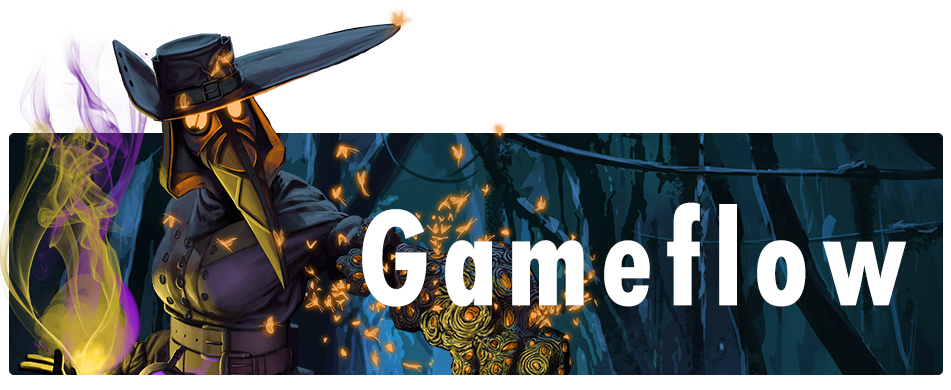

1.) Selection Phase
Each round, both players will secretly select one ability card in their hand and place it face-down. After both players have selected their ability, turn them face up and resolve them simultaneously.

2.) Resolution Phase
First, check for Counters. In the bottom section of the card, some cards list other card symbols that they counter. If your card counters the type of card your opponent played, they return their card to hand and it has no effect. The countering player gains 1 Energy. There might not be a counter every round.
Then, each ability still in play deals damage to the other player equal to its ATK number (the big number in the center of the card). In many cases, both players will take damage during the same round. Damage reduces a character's HP. Cards often have additional effects, listed in their text boxes. Each ability played this turn becomes Exhausted and is placed in the discard pile. Exhausted abilities can’t be played on future turns until they become Ready (usually by playing Rest).
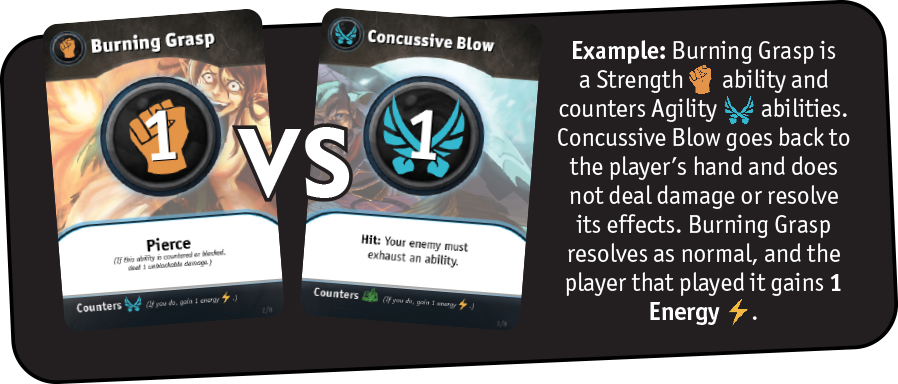

3.) New Round
Repeat steps 1 & 2 until one player is at 0 HP or Executed.

Tie Breaker Rule
In the event that both characters have 0 or less HP at the end of a round, whoever has taken the most damage loses (count HP into the negatives). If HP is tied, continue to play until HP is no longer tied at the end of a round.

Energy
You gain Energy primarily in 2 ways: by playing Rest, and by countering your opponent's cards. Once you have enough energy, you gain access to your Ultimate and/or your Passive. You can have a maximum of 5 energy.


Passives
Your passive card begins face-up on the table. Some passives have a starting side. Once you have the required energy, these passive effects begin to take effect immediately. Sometimes passive cards flip over to a new side when you have enough energy. Passive cards are always on the table and never in your hand. You can continue to gain energy, but it usually has no additional effect.


Ability Ultimates
These cards begin face-up on the table in a space called "stored". Once you have the required energy, Ultimates go into your hand from the stored area immediately and can be played on a future round as an ability. After an Ultimate ability is played, the ability will tell you what to do with it. Ultimate abilities will either become Banished (removed from the game forever), Exhausted (like other regular abilities), or Stored (Back where it came from). When you Store your Ultimate ability, you lose all your energy, but the ability can be unlocked again later with more energy!
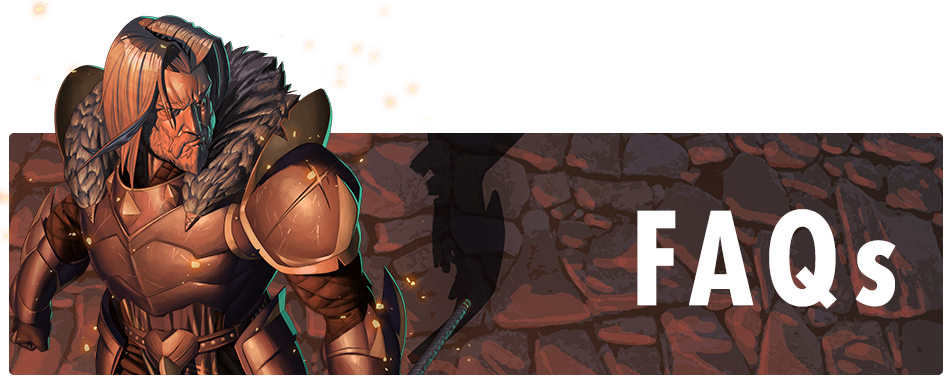
Apply exhausting effects before readying effects. Rest, the most common readying ability, takes place at the end of the round, as a reminder of this interaction.
It will be exhausted and can be readied like any other ability. It doesn’t become Stored unless an effect specifically says so. Passive abilities can’t become exhausted.
Apply any damage before healing. However, remember that you don’t die until the end of a round, so you can go negative and heal back up to a positive HP before the round ends.
If you successfully dealt at least 1 damage, your ability Hit. Likewise, as long as you successfully block at least 1 damage, “when you block” effects will trigger. “When you block” effects will not trigger when taking unblockable damage.
Your opponent’s HP, Energy, exhausted cards, and banished cards are all public information. Ready cards in hand are not, especially in Tournament Mode where you might not know what abilities have been passed. However, in casual play, and when players are learning the game, it’s encouraged to show your opponent your ready abilities (before selecting) when they ask.
Cards are considered played when they are turned face-up, but before they begin to resolve their damage and effects.
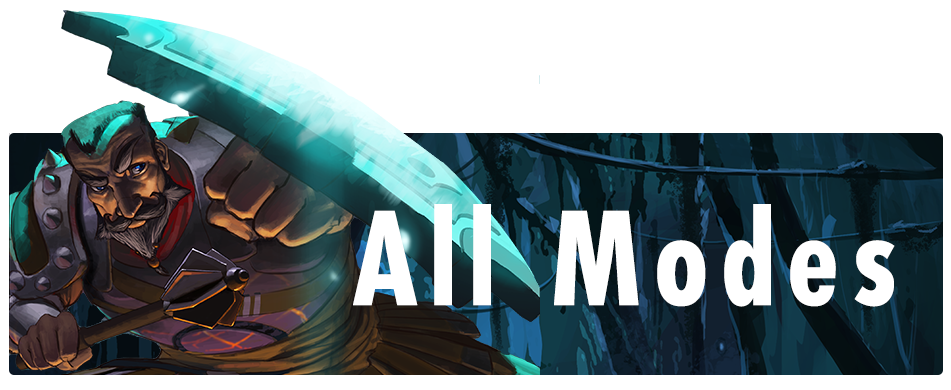
|
Standard Recommended! |
Play with 1 Paragon and play a single game or a best 2 out of 3. |
|
Legacy |
Play with any 3 Paragons and the Ability Inheritance rule. |
|
Conquest |
Play with 3 Paragons and try to win a game with each. |
|
Solo Mode |
Also known as Training Mode. Play against an A.I. controlled enemy. |
|
Solo Gauntlet Mode |
Also known as Training Mode. Play against an A.I. controlled team. |
Legacy Format
Defeat all Three Enemy Paragons to Win
A player must defeat all three of the enemy’s Paragons to win. When you lose your first Paragon, you choose which of your two remaining characters to send in next and complete an Ability Inheritance. The next character and the surviving character start a fresh game with full HP and 0 energy. Once all your characters are defeated, you lose. Both players see the other player’s team of 3 Paragons before choosing which character to play first. Each player chooses their first Paragon secretly, then choices are revealed simultaneously.
Ability Inheritance
When your character is defeated, you may pass one of their abilities on to your next character. This ability replaces an ability of the matching symbol with the next character. If you do pass an ability, you can’t pass an ability that has the no-inheritance symbol, and you can’t replace an ability that has that symbol. The ability you pass is made in secret. For your third character, you may pass the ability that was passed to your second character, AND you may pass an ability from your second character.
Conquest Format
Win with all three of your Paragons
A player must win one game with each of his three Paragons to win the match. Both players see the other player’s team of 3 Paragons before choosing which character to play first. Each player chooses their first Paragon secretly, then choices are revealed simultaneously. When a player wins a game, that winning Paragon cannot be used for the reminder of the match. The losing player can keep the same Paragon used or switch to a different one of their choice. Both players make their next Paragon choose in secret and reveal simultaneously.
Solo Mode
Practice against a specific character or face-off against difficult challenges in this Solo Mode.
|
Solo Mode |
Play against various A.I. controlled opponents. There is an custom A.I. card for every characters in Pocket Paragons! You can find the original 10 Origins A.I. cards in the Origins box. You can find those and many more in the web only Solo Mode PDF. (Coming soon) |
|
Gauntlet Solo Mode |
Can you beat a team of 3 A.I. Paragons in a Legacy game? Gauntlet cards (found in Pocket Paragons: Origins) determine the order the A.I. plays their Paragons and which abilities they pass down to their team mates. You can find more Gauntlet cards in the web only Solo Mode PDF. (Coming soon) |
|
Challenge SoloMode |
Apply the challenge text box found on A.I. Paragons at the start of any A.I. game for a very difficult battle. |
Setup
Choose your Paragon and your opposing Paragon. Look at the opponent’s A.I. character card to form the A.I. deck. On the bottom left, you will see a series of numbers. Find these A.I. cards and shuffle them to form the A.I. deck. Place your enemy’s regular abilities cards face-up in front of you. As they become exhausted, flip them face-down.
The A.I. Deck
Each round, choose your ability, then shuffle the A.I. deck and draw a card at random. Reading from top to bottom, your enemy chooses to play the first ability your enemy has available to them .Discard AI cards after they're played. When A.I. plays Rest, shuffle all their A.I. deck back together.
Execute Rule
If the human player has Rest as their only ready ability and the A.I. has Weapon ready, A.I. will always choose to play Weapon. If the A.I.’s Weapon is not ready, A.I. will play Rest .
Exhaust/Ready Rule
When you force an A.I. to exhaust an ability, use the exhaust priority, going from left to right and exhausting the first ability they still have ready. When the A.I. has a choice to ready an ability, ready the first exhausted ability they have, from right to left.
See the Solo Mode in Action! You can get your own copy of the Solo Mode in Pocket Paragons: Origins.

Stay in the loop with the latest in Pocket Paragons.
Thank you for subscribing!
Have a great day!
